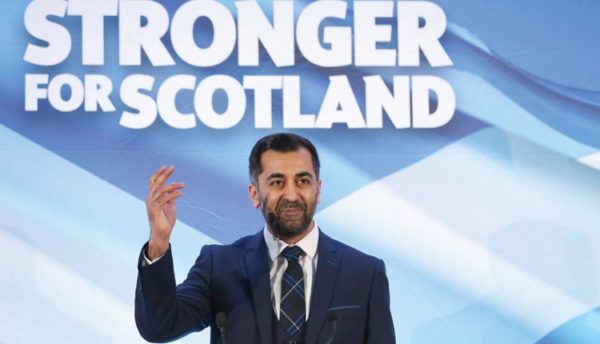The Scottish independenceists chose yesterday Hamza Youssef to succeed Nicola Sturgeon as party leader and thus prime minister, in a move that was met by the first Muslim in the history of the province to hold this position by making a promise to lead Scotland to achieve independence “in this generation.”
Youssef, 37, who is close to Sturgeon, inherits the sensitive task of re-launching the independence movement, which is losing momentum and collides with London’s refusal to allow a new referendum, which was once again expressed by the British government yesterday.
Youssef was Minister of Health and became the first Muslim to head a major political party in Britain. He is supposed to be elected prime minister on Tuesday, in front of the local parliament in Edinburgh.
“We will be the generation that will achieve the independence of Scotland,” Youssef said in his victory speech, stressing that the Scottish “people” “need independence from now on, more than ever.”
However, a spokesman for the British Prime Minister said that Rishi Sunak “looks forward to working” with the new leader of the Scottish National Party, but he rejects the latter’s call for a new referendum on independence.
The spokesman told reporters that the Scots and all Britons want politicians to “focus on the issues that matter to them more than anything else: reducing inflation, addressing the rise in the standard of living and the backlog of (hospitals) work.”
At the end of an internal poll organized after Sturgeon’s sudden resignation last month following her eight years in power, Youssef was ahead of both Finance Minister Kate Forbes, who adopts controversial conservative positions, and Ash Reagan, a former member of the local government.
None of the candidates received more than 50% of the votes in this ballot, as voters classify the candidates in order of preference, and he won the second sorting, when he obtained 52.1%.
More than 50,000 SNP members voted out of an electorate of more than 72,000 members.
And the local government in Scotland, a county of 5.5 million people, can decide on several issues, including education, health and the judiciary.
More broadly, this vote may have major repercussions for the future of the United Kingdom, as divisions have increased between the four constituent regions of the country (England, Scotland, Wales and Northern Ireland) after Brexit.
But support for independence, which is at the core of the SNP’s (left) platform, is stagnating.
According to a poll conducted by YouGov on March 13, 46% of those polled expressed their support for independence (compared to 50% last month).
During the referendum held in 2014, 45% of Scots voted in favor of independence.
And the issue of independence was re-launched because of Brexit in particular because 62% of Scots opposed Britain’s exit from the European Union, and the Scottish National Party saw a break with London as a way to return to the European Union.
According to Youssef, too much time was devoted to emphasizing the failure of the British government in London and not enough to create a vision of an independent Scotland. On Monday, he pledged to launch a popular movement for the right to self-determination.
According to the Ipsos Institute, Kate Forbes was the favorite candidate for the Scots, as she received 27% of support, compared to 22% for Hamza Yousef and 14% for Ash Reagan.
However, within the Scottish National Party, Youssef came first with 38%, followed by Kate Forbes with 37% and Reagan with 22%.
Forbes’ campaign had a difficult start because of her conservative views. She is a member of the Free Church of Scotland, which opposes abortion.
Hamza Youssef embodies continuity in progressive positions on social issues and the economy’s orientation to the left, as he desires, for example, to increase taxes on the richest. He has faced criticism for his performance in his various roles in the Scottish government.
Sturgeon, 52, abruptly announced her resignation on February 15, saying she no longer had the necessary energy after eight years in power.
And the British High Court ruled last year that the Scottish government cannot organize a new referendum without London’s approval. But Sturgeon said she had “every confidence” that her successor would be able to lead Scotland to independence.
Globe echo


Leave a Reply
You must be logged in to post a comment.